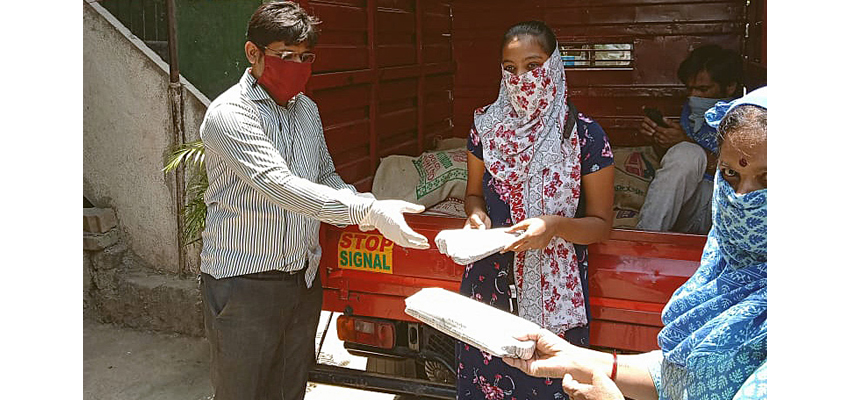The Three Rs of COVID Funding

With the International Labour Organisation (ILO) predicting that nearly two hundred million global citizens will lose their jobs by the end of the COVID crisis, relief, recovery and resilience are important to counter the colossal crisis in industry
Relief, Recovery and Resilience are as important today for organisations and societies to consider as the three Rs of Reading, Writing and Arithmetic were for us to learn as children. And even as the world and our own country sees a glimmer of hope that the worst stage of the COVID Pandemic will be behind us, it is important for every responsible and thoughtful citizen to carefully weigh the relative importance of each of these stages and distribute our attention and our philanthropic monies in places where we can maximise impact.
In India, we have seen a wave of responses to the relief imperative even as the COVID infection curve keeps climbing and Governments struggle to keep citizens at home on one hand and cater to the hunger and angst of daily wage and migrant workers who were suddenly displaced from daily wages. Contributing to PM-CARES became an imperative and non-profits like Pune City Connect and aggregators like Social Venture Partners jumped into the fray to directly support desolate families or in some cases channelise CSR funding for this effort. Many of us who have been involved in this since the end of March have been gratified by the number of lives we have been able to save in the communities we were serving with our education, literacy and skills initiatives.
As one of my favourite authors Gurcharan Das has said, the difficult choice as we move further is that between saving the villager or saving the village. While this seems to be an awful choice to make, the Governments in all countries are having to decide when and to what extent to open up the economy and attempt a “V” shaped recovery, even as they run the risk of a repeat surge of infections with more contact happening between people in offices, factories and transportation even if restaurants and malls and cinema houses stay closed a lot longer. This is when the focus on a painless recovery will be most and entities like NES and SVP in Pune have already started creating livelihoods by funding poor women to make masks for all the people who will be returning to the streets of our cities and towns.
This is also the stage when entrepreneurs and company CEOs of larger employers will have to be counselled and, in many cases, entreated to be fair to their employees and suppliers and avoid job losses to the maximum extent possible. Any knee-jerk actions by corporations will have ripple effects on their suppliers and will further aggravate job losses and misery in the environment. Navigating carefully through recovery is essential to restore businesses and the economy to a new normal as soon as possible.
There will be a lot for all of us to do in both stages of recovery and resilience in work and life
Finally comes the importance of building resilience in business, economy and society even as the recovery process plays out over the next few weeks or even months. The extensive use of digital would have changed the nature of work inexorably and it is possible that the jobs that people were being trained for would cease to exist. Automation, Robotics and Artificial Intelligence will be the focus of all work planners because work from home becoming a norm and the need to continue a degree of social distancing to and from and at work will necessitate less use of human resources everywhere. Resilient corporations will be those which ensure multiskilled workforces and create the managerial capability to deliver value with distributed teams. In factories, workers co-existing with extensive low-cost automation will be the norm and most data centres will vanish into the cloud reducing the burden on the staff and in fact eliminating them altogether.
The International Labour Organisation (ILO) has come up with a rather disturbing prognosis that nearly two hundred million global citizens will lose their jobs by the end of the COVID crisis, which would cause huge stimulus and furlough pressure on Governments. But what is more disconcerting is that the jobs which tens of millions of this group were performing may not be reinstated again. The “new normal” of low employment, high automation and maximum “work from home” will free up real estate, put multiple indirect jobs in transportation, hospitality and security under pressure and demand very supportive emotional intelligence on the part of leaders.
There will be a lot for all of us to do in both stages of recovery and resilience in work and life. There are already concerns in India, a few weeks into the lockdown of widespread isolation by being cooped up in often unattractive home environments. The problems we have seen in the West of psychological issues and depression caused by poor human to human interaction will begin to surface in bustling Asian societies, particularly India. Many of us who have seen cycles of boom and bust in Indian and global environments will have a responsibility to counsel, guide and comfort many people who will be caught in the rapid transition of work processes that we should expect in every industry.
I have a favourite Chinese curse which goes “may you live in interesting times” and this time the “Chinese virus” as President Trump called it, has really brought this upon all of us!